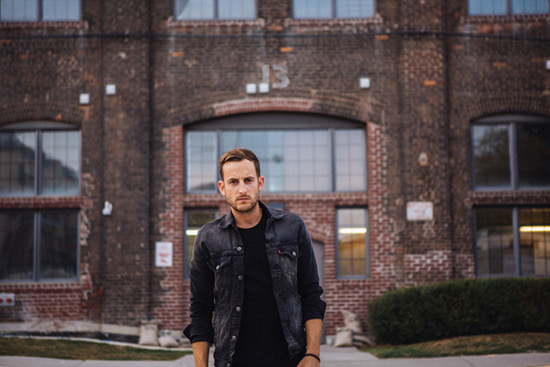
New Talent: Mark Bone

Mark Bone was inspired to take up filmmaking while doing humanitarian work in Africa after high school. He felt a need to tell the stories of the Sudanese refugees that he was meeting, and took up film school on return, focusing on documentary making. Since then the Canadian director has branched out into commercial work - he’s repped by Revolver Films in Toronto - shooting for the likes of Mercedes-Benz and Nike, but his eye for documentaries is always imbued in his branded films. What’s more, his latest project, a short documentary about the Rescate Ambar volunteer paramedics in the Dominican Republic - a group he met in devastating circumstances - is truly inspiring and beautifully captured by Mark. It’s been a Vimeo Staff Pick, won Best Short Film at the RedLine Film Festival and recently made its US debut at the Brooklyn Film Festival.
LBB’s Addison Capper chatted with Mark to find out more about the project and his approach to filmmaking.
LBB> Where did you grow up and what kind of kid were you?
MB> I grew up in Grimsby, Ontario, Canada - it’s a small town an hour outside of Toronto. I was an energetic kid, to put it kindly. I loved making people laugh and I wasn’t averse to being the centre of attention. I think this led me to pursue the arts, including theatre, which eventually led me to discover filmmaking.
LBB> You focused on documentary making while studying - why is that? Did you also have ambitions to work in commercials?
MB> Right after high school I volunteered overseas to do humanitarian work in Africa. At one point I was working with a team of doctors who were helping refugees who had escaped the atrocities of the Darfur war in Sudan. I didn’t have medical training so my job was simply to sit with the incoming refugees and hear their stories before they received medical treatment. I quickly discovered that these types of stories fascinated me, and that I felt a need to tell them. Documentary seemed like the best avenue to do this.
Once I started film school I interned one summer at a local Toronto production house, and this was my first exposure to commercials. It was there that I realised the concise, ultra sharp creativity available in short-form filmmaking. After building up a short documentary reel I was eventually asked to start shooting commercials by another production company. I found that I could actually imbue a lot of my documentary instincts into commercials, so I fell in love with the craft.
LBB> Tell us about Rescate - it looks like a truly crazy story. When did you first become aware of the group and what inspired you to make a film about them?
MB> I discovered the story of the Rescate Ambar paramedics through unfortunate circumstances. My best friend at the time was a humanitarian in the Dominican Republic. He was flying back from delivering aid supplies in Haiti when the small plane he was in got caught in a storm and crashed into the ocean. He was never found. Within a day of the accident I rushed down to the Dominican where I first met the Rescate team at the crash site. They are a ragtag group of volunteer paramedics, they work unpaid so they all have separate day jobs to support themselves. There’s extremely limited government funding in the Dominican for first responders, so the Rescate Ambar team was created by regular citizens banding together.
The Dominican Republic is ranked as the second most dangerous country to drive in the world [Eritrea is the most dangerous] so the Rescate Ambar team has their work cut out. I couldn’t help but want to make a film about them. They’re heroes and deserve to have their story told.
LBB> How was the overall production process? The story is based on this being a particularly dangerous place, so what challenges did that create for you as a director?
MB> Production had its challenges but luckily I had filmed in the Dominican many times before, so I was already connected with good local fixers and translators. The biggest challenge was probably my personal endurance. The Rescate team work 24 hours a day, so there weren’t many breaks in production - I always had to be available to film in order to capture them in action. It was a weird moral tension as a filmmaker to have to cope with; hoping that nothing bad happened but also wishing to be there to capture it if it did.
I made a conscious decision before production to try and focus on the characters and less on the carnage. This helped when deciding what scenes I wanted to capture and I think helped make a more interesting film piece.
LBB> What are the most memorable moments from producing that project?
MB> I think the most memorable moment for me will always be the graveyard scene. I always wanted to capture the juxtaposition of the leader of Rescate in his uniform walking through a cemetery amongst the gravestones, as so many of the deceased have passed away from car accidents. It felt like an interesting paradox of someone who saves lives in a location for those who have passed.
Little did I know that we would stumble across his uncle’s gravestone, who had passed away after being hit by a car. When Reynaldo saw it he truly opened up for the first time. He explained with tears in his eyes that that is why he pursues his line of work as a paramedic, to try and save more people like his uncle. It was a powerful moment and I was holding back tears myself while filming. It’s an honour to tell stories like Reynaldo’s.
LBB> Some of your recent projects have been for the likes of Mercedes-Benz and Nike - what do you enjoy about the challenges of shooting work for a client?
MB> I love that a client has an inherent need and goal that they need to express in the film, and my opportunity as a filmmaker is to determine how to tell that notion in the least heavy-handed way, through story. I think there’s a tension between being too overt or too nuanced and essentially losing the message in the commercials. I love the challenge of trying to craft the most authentic, believable story that still captures the ethos of the brand’s message. I think my documentary experience has allowed me to determine what feels authentic and what feels too forced since I’m so used to working with real people. There’s a limit to how far you can push a non-actor in their performance before it begins to feel disingenuous, and the same goes with the message being communicated for a brand.
LBB> You’re passionate about global issues and humanitarian projects - how does that inform the work that you do? Do you feel as though directors should use their storytelling power more to better influence the world?
MB> My dad does a lot of humanitarian work and he always told us that we had won the ‘birth lottery’, having been born in a country like Canada. I took this to heart when pursuing filmmaking and always felt the weight of wanting to have an intentional impact with my work and craft. I don’t want to create a body of work that is without meaning. I really desire to create films that benefit less fortunate people.
I don’t wish for other filmmakers to feel guilty about the films they create. I think our world needs a variety of artists creating a wide spectrum of work. Most of my favourite films have nothing to do with humanitarian endeavours (Winter’s Bone, Sicario, No Country for Old Men). I just personally find myself compelled to want to tell real stories about people facing adversity. I want my work to feel raw, beautiful and honest.
LBB> How would you define your directorial style?
MB> I love real people, real places and real stories, but I don’t like to just capture them ‘as is’. I want to tell truth in the most engaging and cinematic way possible. I want my films to feel real and raw yet draw the audience into a deeper visual world. With Rescate I aimed to show the intensity of paramedics’ work while still capturing the beauty and rhythm of their lives. I love to tell a real story but make it feel like a narrative film. Just because some of my work is documentary, doesn’t mean it should sacrifice the visual integrity of the piece.
LBB> Who are your creative heroes and why?
MB> Denis Villeneuve is one of my filmmaking heroes, he has really broken the mould for Canadian film directors. Year in, year out, he directs some of the most talked about and stylised films. His approach is effortless and he makes no sacrifices in the quality of his craft. Music is a huge influence for me when it comes to my filmmaking, and you’re in for a wild ride on any soundtrack for a Denis Villeneuve film. He is a great example of a director who creates raw and believable films without cinematic compromise.
I also must give love to Matthew Weiner, the creator of Mad Men. I’m watching that series with my wife for the third time and it’s still so gripping to me. I think that the cast is some of the best-drawn and most complex characters portrayed in a series. You truly never can predict what is going to happen next or what someone will say on that show, and this makes it feel real. Life is so unpredictable and so is Mad Men. It was refreshing and I truly loved watching it.
LBB> What do you like to get up to outside of work?
MB> I just recently got married, so I’ve been trying my best to spend as much time with my wife in our first year. We’ve been lucky to get in a lot of travelling this past year, which has been incredible.
I’ve also become a pretty avid fan of a little known sport called Spikeball (look it up!) and I’m starting to travel to play in competitive tournaments. My teammate and I do fairly well, but I think that’ll be short lived as the sport gets more popular.













